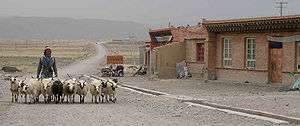Xiahe County
.png)
Xiahe (Chinese: 夏河; pinyin: Xiàhé; Tibetan: བསང་ཆུ་, Wylie: bsang chu, ZYPY: Sangqu ) is a county in Gannan Tibetan Autonomous Prefecture, Gansu province, the People's Republic of China. It is home to the famed Labrang Tibetan Buddhist monastery, one of the largest Tibetan Buddhist monasteries outside the Tibet Autonomous Region. The town is populated largely by ethnic Tibetans, as well as some Hui and Han Chinese. The area is highly rural and pastoral (including yak and other animal rearing). The geography is mountainous. In recent years it has become a tourist attraction. The town was named Xiahe in 1928.

History
Xiahe (Sangqu) used to be part of Qinghai when it was under the control of Chinese Muslim General Ma Qi.[1] It was the site of bloody battles between Muslim and Tibetan forces.[2][3][4]
Location
Xiahe (Sangqu) is found in the southern portion of Gansu province, along the western border with Qinghai province. It lies along the Daxia and Zhao rivers. It is on the northeast edge of the Qinghai-Tibet Plateau. The average elevation is 2900 to 3100 m with the highest being 4636 m and lowest is 2160 m.
Name
The name (both Chinese and Tibetan), which literally means, "Xia River" refers to the Daxia River which runs through the county.
References
- ↑ Frederick Roelker Wulsin, Joseph Fletcher, Peabody Museum of Archaeology and Ethnology, National Geographic Society (U.S.), Peabody Museum of Salem (1979). Mary Ellen Alonso, ed. China's inner Asian frontier: photographs of the Wulsin expedition to northwest China in 1923 : from the archives of the Peabody Museum, Harvard University, and the National Geographic Society (illustrated ed.). The Museum : distributed by Harvard University Press. p. 49. ISBN 0-674-11968-1. Retrieved 2010-06-28.
- ↑ Dean King (2010). Unbound: A True Story of War, Love, and Survival (illustrated ed.). Hachette Digital, Inc. ISBN 0-316-16708-8. Retrieved 2010-06-28.
- ↑ Paul Hattaway (2004). Peoples of the Buddhist world: a Christian prayer diary. William Carey Library. p. 4. ISBN 0-87808-361-8. Retrieved 2011-05-29.
- ↑ Gary Geddes (2008). Kingdom of Ten Thousand Things: An Impossible Journey from Kabul to Chiapas (illustrated ed.). Sterling Publishing Company, Inc. p. 175. ISBN 1-4027-5344-6. Retrieved 2011-05-29.
External links
| Wikivoyage has a travel guide for Xiahe. |
- People's Government of Xihae Official Website Chinese version
- People's Government of Xihae Official Website English version
- Journey through China - A site with numerous pictures of Xiahe.
- http://www.synaptic.bc.ca/gallery/xiahe.htm
Coordinates: 35°12′N 102°31′E / 35.200°N 102.517°E